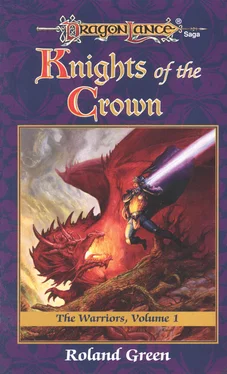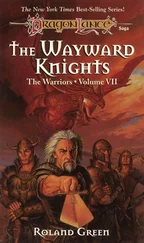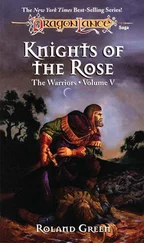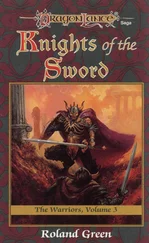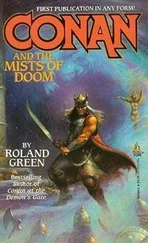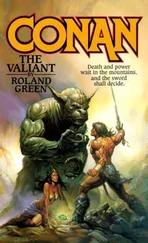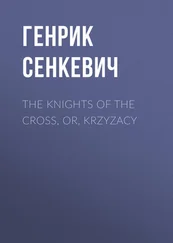Roland Green - Knights of the Crown
Здесь есть возможность читать онлайн «Roland Green - Knights of the Crown» весь текст электронной книги совершенно бесплатно (целиком полную версию без сокращений). В некоторых случаях можно слушать аудио, скачать через торрент в формате fb2 и присутствует краткое содержание. Жанр: Фэнтези, на английском языке. Описание произведения, (предисловие) а так же отзывы посетителей доступны на портале библиотеки ЛибКат.
- Название:Knights of the Crown
- Автор:
- Жанр:
- Год:неизвестен
- ISBN:нет данных
- Рейтинг книги:3 / 5. Голосов: 2
-
Избранное:Добавить в избранное
- Отзывы:
-
Ваша оценка:
- 60
- 1
- 2
- 3
- 4
- 5
Knights of the Crown: краткое содержание, описание и аннотация
Предлагаем к чтению аннотацию, описание, краткое содержание или предисловие (зависит от того, что написал сам автор книги «Knights of the Crown»). Если вы не нашли необходимую информацию о книге — напишите в комментариях, мы постараемся отыскать её.
Knights of the Crown — читать онлайн бесплатно полную книгу (весь текст) целиком
Ниже представлен текст книги, разбитый по страницам. Система сохранения места последней прочитанной страницы, позволяет с удобством читать онлайн бесплатно книгу «Knights of the Crown», без необходимости каждый раз заново искать на чём Вы остановились. Поставьте закладку, и сможете в любой момент перейти на страницу, на которой закончили чтение.
Интервал:
Закладка:
Marod had few doubts about the man who, before today’s sunset, would be a Knight of the Crown. But there was even less doubt that once he had been a thief in Istar, and a prosperous one. Who would next prove worthy of the ranks of the Solamnic Knights? Kender, elves? (Full elves, that is, not half-elves, who were not unknown in the ranks of the knights and seldom much troubled if they were quiet about their ancestry.)
Two things were certain, however (at least to Sir Marod; he had doubts about other knights, beginning with Lewin). One: Almost any race could produce those who understood honor, loyalty, prowess, and statecraft. (Well, perhaps not gnomes, gully dwarves, or the majority of minotaurs.) Two: The knights could achieve little honor through their own extinction.
Content with these truths as a basis for his plans, Sir Marod quickened his pace toward the great hall.
Chapter 1
The thief crouched on the branch that reached toward the high wall of the estate. The night and the leaves concealed him for the most part, and the garb of his trade (or art, as he sometimes thought it) finished the work.
It was a summer night in Istar, so he wore shirt and trousers of light linen, dyed a soft, lustrous black and made to fit snugly, to avoid snagging on thorns or giving handholds to an enemy. His feet were shod with moccasins in the style of the Qualinesti elves’ rangers, silent, supple, and also black.
He wore sailors’ gloves, with strips of sharkskin woven into the palms for a better grip and light chain mail under the leather and sharkskin. He had no subtle sense of touch with these gloves, but for now he wanted his hands protected, not sensitive.
Where his shirt revealed his sinewy neck and throat, a dull glimmer of metal also revealed more light mail. A Knight of Solamnia or a seasoned officer in Istar’s army would have admired that mail-then wondered where its wearer had obtained it.
The wearer was alive and free today because he did not linger to answer such questions, even when he could not keep them from being asked in the first place.
Around his waist the thief wore a heavy belt of black leather, hung with various pouches that swayed ponderously and bulged suspiciously. They were rather an odd assortment, some bought in Pursemaker’s Square, some acquired during the course of the wearer’s “night work,” and some made with his own hands from properly bought-and-paid-for materials to hold special tools that not one of his craft could be trusted to see.
There were more than a few of the last, for the man had been a thief for nearly fifteen years.
On his head he wore a metal cap, forged to protect the back of his head and covered with black padding both within and without to prevent chafing and soften blows. It left his ears and the whole of his face, cheeks, and throat bare-except for a carefully applied coat of blackening.
Some of the thief’s comrades preferred all-encompassing combinations of hood and mask. Pirvan thought those interfered with an honest thief’s hearing, might slip out of position to block his eyes, and were generally as much hazard as help.
Even among those who blackened their faces, there were differing opinions about the best material. Some favored ashes of burned Glorious Beans, others elk’s-milk leaf mixed with dried bilberries, the whole burned while a Red Robe wizard cast certain minor spells over it. The thief felt that the first wore off too quickly, and that the second lasted forever-and took even longer to pay for. (Not all who lived by theft, he thought, were those who actually worked at night. There were more than a few who lived by selling to night workers that which they did not need at prices they could not truly afford.)
The crouching thief preferred a simple mixture of milk-washed hearth ashes and bear’s grease, applied generously. It had taken him some years to find a mixture that would keep anyone from gripping his face but would not shine in the moonlight, which could impartially betray thief or victim-and it did not matter which of the two bright moons cast the light. Virtuous Solinari and neutral Lunitari had at various times both helped and hindered the thief.
But he would have no more gone bare-faced to a night’s work than he would have gone full-armed. The only weapon that shared space on his belt with the purses was a stout-bladed dagger, with an even stouter pommel. That pommel had much to do with the dagger’s seldom having shed blood, as much as did Pirvan’s distaste for violence. With the dagger reversed and the pommel applied smartly to an opponent’s wrist, knee, or skull, it was a rare man who continued fight or pursuit, if he did not fall down senseless to wake later, in need of healing but not of burying or mourning.
The thief was more than a trifle proud of the fact that, though he had in his time profited enough from his night work to afford a manor (had he so chosen), no one mourned kin or swore vengeance for a life he had taken. There were those who had sworn to avenge the theft of every sort of possession, from strongboxes of golden coins to vials of alleged Qualinesti love potions. They were rare, however, folk who would avenge their goods, and less dangerous than those who sought blood.
Or so experience had taught the man who called himself Pirvan the Thief. (As with most of the brothers and sisters of the night work, he used no family name, to protect both himself and any kin.) Tonight experience would teach a different lesson, and set him on a long road away from night work. Pirvan the Thief was about to become a hero, because he could not resist the challenge of stealing the dowry jewels of Lady Eskaia of House Encuintras.
Pirvan was crouching by the wall around the Encuintras estate in a year when Istar ruled or at least reigned over all the human regions of Ansalon and more than a few lands held by other races. Its rule was neither as just as it had once been, nor as grasping as it later became. There were those among Istar’s subjects who thought times had been better when they had ruled themselves, but in any year few went beyond muttering into their ale in the company of discreet friends.
Those mutterers, the rulers of Istar (merchants, priests, and soldiers, with occasional reluctant advice from the Towers of High Sorcery) largely left in peace. If one did not molest the various instruments of Istar’s rule, one seldom suffered their attention.
It goes almost without saying that Istar’s rule brought wealth to the city. Indeed, never had Krynn seen so much wealth gathered in one place. The blood of fighters in the arena flowed over gilded armor, and there was at least bread and wine, clean water, and healing for all but the poorest.
This wealth changed hands by many means, from the most lawful (purchase or tax collection) down to the work of the common cutpurses and smash-and-snatch artists. Pirvan was a thief of the highest sort, who stole more than he needed to keep food in his belly only because he enjoyed the challenge of besting someone’s defenses.
Even Pirvan’s kind of thievery was not a recognized profession, with a guild of its own. Both the laws of Istar and the demonstrated will of the gods limited the lawfulness of thieves. But there were those among the ranks of the wise thieves who sat in judgment on their comrades when they behaved too much like cutpurses, killing, hurting without need, stealing too much or from those whom the loss would injure, or engaging in other outrages.
Pirvan’s hands had been clean these past fifteen years, and he was proud of the fact. But a man who practices both honor and theft walks a tightrope over the Abyss, and at various times good, neutral, and evil gods may give that rope a tweak, if only to see what may happen.
The idle curiosity of the gods had been the downfall of many men living less dangerously than Pirvan the Thief.
Читать дальшеИнтервал:
Закладка:
Похожие книги на «Knights of the Crown»
Представляем Вашему вниманию похожие книги на «Knights of the Crown» списком для выбора. Мы отобрали схожую по названию и смыслу литературу в надежде предоставить читателям больше вариантов отыскать новые, интересные, ещё непрочитанные произведения.
Обсуждение, отзывы о книге «Knights of the Crown» и просто собственные мнения читателей. Оставьте ваши комментарии, напишите, что Вы думаете о произведении, его смысле или главных героях. Укажите что конкретно понравилось, а что нет, и почему Вы так считаете.
